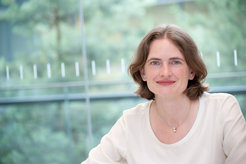Prof. Dr. Tanja Weil

Prof. Dr. Tanja Weil joined the Max Planck Society in 2017 as one of the directors of the Max Planck Institute for Polymer Research, heading the division “Synthesis of Macromolecules”. She studied chemistry (1993–1998) at the TU Braunschweig (Germany) and the University of Bordeaux I (France) and completed her PhD at the MPI for Polymer Research under the supervision of K. Müllen. In 2003, she received the Otto Hahn Medal of the Max Planck Society. From 2002 to 2008 she managed different leading positions at Merz Pharmaceuticals GmbH (Frankfurt) from Section Head Medicinal Chemistry to Director of Chemical Research and Development. In 2008 she accepted an Associate Professor position at the National University of Singapore. Tanja Weil joined Ulm University as Director of the Institute of Organic Chemistry III / Macromolecular Chemistry in 2010. She has received numerous competitive funding at both national and international level including a Synergy Grant of the European Research Council (ERC). She serves in many advisory boards and steering committees: she is a member of the senate of the German Research Foundation, a member of the senate of the Leibniz Association and of the Leibniz evaluation panel. Tanja is an associate editor for JACS and a member of the editorial advisory board of ACS Nano. Her scientific interests focus on innovative synthesis concepts to achieve functional macromolecules and hybrid materials to solve current challenges in biomedicine and material science.
Selected Awards
| 2023 | Karl Ziegler Award |
| 2022 | Laureate Dr. Manfred-Jäger-Symposium, Heinrich-Heine-University Düsseldorf |
|
2022 |
2022 Annual Warwick Polymer Chemistry International Lectureship |
|
2020 |
Netherlands Scholar Award for Supramolecular Chemistry, February 2020 |
|
2017 |
Honorary Professor Johannes Gutenberg University Mainz |
|
2016 |
Honorary Professor Ulm University |
|
2014 |
Bruno-Werdelmann-Lecture of the University Duesburg-Essen, Germany |
|
2013 |
Solvay Colloquium, Brussels, Belgium |
|
2012 |
Synergy Grant of the European Research Council (ERC) |
|
2002 |
Otto Hahn Medal of the Max Planck Society, Germany |
Selected Professional Activities
2022– | University Council Member of Ulm University |
2022– | Advisory Board Member for Biotechnology of the State of Rhineland-Palatinate |
2021 – | Fellow of the executive Board of the Max Planck School Matter to Life (MtL) |
2021– | Associate Editor, Journal of the American Chemical Society, ACS |
2020– | Board Member of the Mildred Scheel Foundation for German Cancer Research |
2019– | Director Max Planck-Bristol Centre for Minimal Biology |
2018–2020 | Associate Editor ACS Nano, ACS |
2018–2021 | Editorial Board Member Angewandte Chemie, Wiley |
2017–2025 | Senate Member of the German Research Foundation |
2017– | Steering Committee Member of the Max Planck Graduate Center (MPGC), Mainz, Germany |
2016–2024 | Member of the Senate of the Leibniz Association and member of the evaluation panel |
2015– | Advisory Board Member Advanced Science, Wiley |
